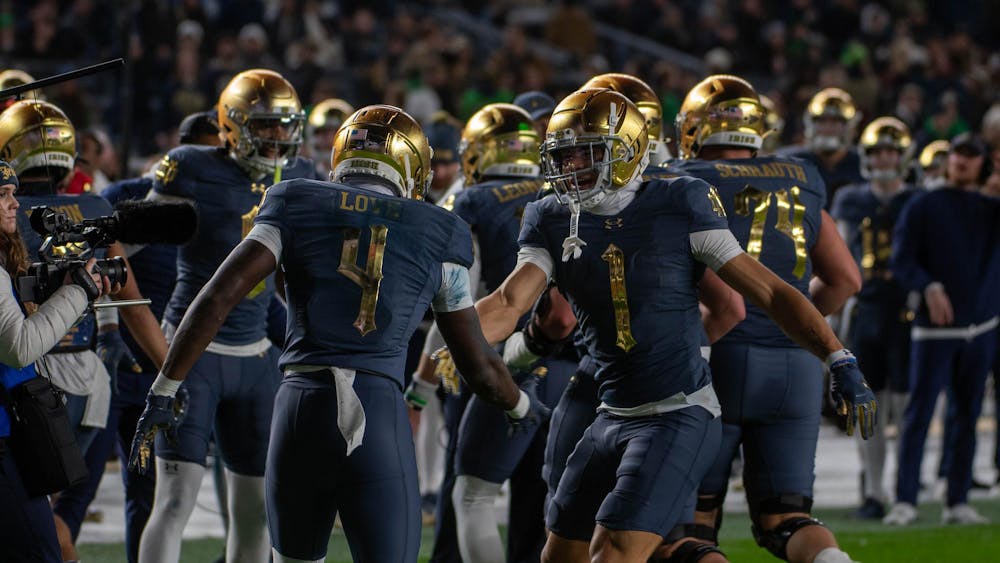Throughout the last century, third-year success has become a revered expectation for the head football coach at the University of Notre Dame. For Frank Leahy (1943), Ara Parseghian (1966), Dan Devine (1977) and Lou Holtz (1988), the third year brought national championships. For Knute Rockne (1920) and Brian Kelly (2012), it was undefeated regular seasons.
Current head coach Marcus Freeman’s third season began with a shocking home defeat to Northern Illinois. Then, exactly 100 days later, he was rewarded with a massive contract extension that made him one of college football’s highest paid coaches. So what happened in between and directly following?
After some in the passionate Irish fanbase mercilessly called for his firing in early September after the crushing loss to NIU, Freeman masterfully guided Notre Dame to a 13-game winning streak which included the program’s first major bowl victories in over three decades, culminating in a National Championship game appearance. Although Freeman’s Irish fell in a heartbreaker to his alma mater Ohio State, Freeman's leadership throughout his third year garnered unrelenting love and support from the fans, as well as national recognition amongst the sport’s top coaches.
Despite the turnaround, Freeman still faces immense expectations as he enters his fourth season in South Bend. Following the National Championship loss, there were rumors he would bolt for the NFL before his mastermind defensive coordinator Al Golden actually did. Additionally, fan-favorite quarterback Riley Leonard exhausted his eligibility, meaning Freeman and company are faced with an open competition at the game’s most important position. All this to say, Marcus Freeman still has work to do as he aims to bring a hungry program, administration and fanbase its first national championship in 37 years.
“That’s the reality of the profession as a head coach. You don’t have much time to recalibrate,” Freeman reflected as he returned to the Guglielmino Athletics Complex in preparation for the spring season. The reality of the hyper-fluid landscape of college athletics is that there isn’t much time to take a step back and reflect.
This was evident when Golden, the mastermind of the nation’s No. 1 defense in 2024, took the Cincinnati Bengals job just 72 hours after the Irish got burned on third-and-11 to close out the National Championship. Less than a week later, Freeman turned to former Rutgers head coach Chris Ash to lead the defense. Freeman has now had six coordinators in just four years, but he’s been impressed with the camaraderie his defensive staff has shown since materializing.
“I’m really pleased with the leadership and unity coming from the defensive staff,” Freeman said. “It’s all going to reflect in the way that our defense plays.”
While All-Americans Howard Cross III, Jack Kiser, Rylie Mills and Xavier Watts are all gone to the NFL, the defense does return key starters in the secondary, including junior Christian Gray, sophomore Leonard Moore and sophomore Adon Shuler. Freeman expressed that much of the strategy with these returners will carry over under the new defensive regime, but added, “For those guys it’s just about continuing to learn the different details that coach Ash is emphasizing with how he wants the defense to play schematically.”
While offensive coordinator Mike Denbrock’s return provides some continuity on the other side of the ball, Leonard’s departure represents even more uncertainty. In his first two offseasons at the helm, Freeman turned to the transfer portal to pluck talented ACC signal callers in Sam Hartman of Wake Forest and Leonard from Duke. But this offseason was different.
Freeman and company opted to turn in-house, setting up a competition between three returners: the steady senior Steve Angeli, the mobile junior Kenny Minchey and the talented sophomore CJ Carr. Although a new approach in his tenure, Freeman is looking forward to the contest.
“I’m excited because I love competition and I think it’s going to make all three guys better,” Freeman said. Speaking on how he and the staff are approaching the evaluation process, he added, “As a coaching staff you want to get them all more reps, but they all have handled it perfectly focusing on the reps they get and doing the best job they can.”
Freeman has said that a decision has no set timetable, implying that the competition will run through the summer and potentially into fall camp. He has been impressed with each quarterback so far.
“All three quarterbacks in that competition have done a good job rallying the offense,” he said. Their initial success is not a surprise to him, however. “They’ve been exactly what I thought they would be: mature guys who take care of business and take advantage of the opportunities they’re given.”
As the Irish wrap up the spring season and officially turn their attention to 2025, Freeman recognizes the importance of growing on the collective experiences of the past. But he also understands that progress doesn’t come from basking in prior glory.
“I have a strong belief that your past creates the foundation for your present,” he said. “We have to use the good and the bad that we went through last year to make sure that our foundation as a football program in 2025 is higher than it was in 2024.”
So yes, Marcus Freeman has certainly established himself as the face of the Notre Dame football program. But can his new-look coaching staff and fresh roster compete on the biggest stage as he enters year four? Only time will tell as Miami awaits on Aug. 31, but Saturday’s Blue-Gold Game may provide some insight in the meantime.










